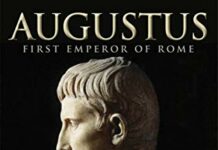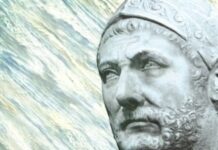
Ebook Info
- Published: 2006
- Number of pages: 724 pages
- Format: PDF
- File Size: 6.05 MB
- Authors: Adrian Keith Goldsworthy
Description
This “captivating biography” of the great Roman general “puts Caesar’s war exploits on full display, along with his literary genius” and more (The New York Times) Tracing the extraordinary trajectory of the Julius Caesar’s life, Adrian Goldsworthy not only chronicles his accomplishments as charismatic orator, conquering general, and powerful dictator but also lesser-known chapters during which he was high priest of an exotic cult and captive of pirates, and rebel condemned by his own country. Goldsworthy also reveals much about Caesar’s intimate life, as husband and father, and as seducer not only of Cleopatra but also of the wives of his two main political rivals. This landmark biography examines Caesar in all of these roles and places its subject firmly within the context of Roman society in the first century B.C. Goldsworthy realizes the full complexity of Caesar’s character and shows why his political and military leadership continues to resonate thousands of years later.
User’s Reviews
Reviews from Amazon users which were colected at the time this book was published on the website:
⭐That Napoleon Bonaparte reportedly read the literary works of Julius Caesar extensively, speaks volumes of the latter’s influence on posterity centuries later. Author, Adrian Goldsworthy, in his highly acclaimed historical and biographical work entitled Caesar: Life of a Colossus advises us of this fact among others. Julius Caesar was born in the year 100 B.C. to a noble and aristocratic family which was well-connected in the Republic of Rome. He was intelligent and keenly perceptive about his social status. In addition, he had the additional benefit of pursuing a soundly tutored, logically focused, philosophical education, which would prepare him for the fast-track career of his choosing either as a civic-minded office holder or a uniformed military leader. Among his earlier achievements, he was appointed to the position of high priest. Go figure! Later, he began to search for his true calling in life, practicing law as an advocate. He defended well-established, high-profile clients. But what most catapulted his career was serving in the capacity of a conquering military general. You might say that he had shown great potential for advancement in his chosen career path. He was given numerous military commands and led legions upon legions of Roman soldiers over the years. He was proven victorious, time and time again. Mostly on foreign soil, he won ever greater wealth, power, and accolades. You can easily see how possessing this type of information about a singular member of their own peer group might impress the likes of Napoleon, Churchill, Patton, and a great many other decorated officers of modern times. It certainly affected those of Julius Caesar’s. Plus the fact that he went to great lengths in documenting practically every battle of every campaign he had ever fought with detailed precision, no doubt enhanced his fame and fortune. To say that Julius Caesar followed in the footsteps of Alexander the Great would be an understatement. This says a lot about the character of the man. Besides documenting the life and exemplary deeds of Julius Caesar in his meteoric rise to become the most powerful man in Rome, if not in the entire civilized world in the last century B.C., the author delved deeply into what made the Roman leader “tick.” Clearly, he was a product of his exclusive environment, the aristocratically-led Roman Republic, for which he proudly stood. In consequence, the author dug even deeper into the concepts involving the profound and far-reaching vastness of Roman government itself. He focused in on the opportunities which it afforded “certain qualified individuals,” due to their birth-right, their strong abilities, the competitive nature of their training, and just plain luck, being in the right place at the right time. He revealed how the complex system was organized, how its hierarchy functioned, how its laws were enacted and by whom, and how the system continued to change and evolve over the decades as a result of an ingrained “survival instinct” which kicks in during times of danger or great peril. The reader soon realizes that once these “certain qualified individuals” have learned to climb the social ladder of success, they begin to rise like carbonated bubbles floating to the surface within the sweet, syrupy liquid that is government to even greater, more lucrative, powerful, and prominent positions. The process of advancement is analogous to working in the mail-room of a large corporation today, in order to get one’s foot in the door, as they say, transferring to sales representative, becoming a marketing associate, then operations director, CEO, vice-president, and ultimately, president, “the big Kahuna.” The bottom line is he had to keep those greedy stockholders satisfied with large profits and good returns on investment. They quickly learned the competitive nature of the business in a vicious dog attack dog world. In the last century B.C., instead of simply firing the average individual applicant and giving him the opportunity to find a new job, the powers that be would exile him into oblivion, or simply execute him on the spot. Thus, there is a subtle difference between the Roman Republic as it was, and the much improved democratic laissez faire free-enterprise system of today. The author went on to suggest that Julius Caesar’s career may have been hampered by his unpredictable fits of epilepsy, but it might just as well have been his fits of rage. He had a terrible temper. The question of his virility was brought into play. Some inquired, “Was he a lover or a fighter?” Many experts believe that he was both. I think, he fought to protect his investment, and he made love for the same reason. I also believe that life in Rome might have been much improved had some of the Romans turned their swords into scissors. As it was, a decent pair of center-pivot scissors would not be invented for another hundred and fifty years or so, from the time Julius Caesar was in the prime of his life. The modern version of the center-pivoting scissors was supposedly invented in Rome sometime around the end of the first century A.D. So, it was never easy to cut through all the bureaucratic red tape. What could not be emphasized enough in the book, however, in my opinion, is the quintessential fact that there are greater forces at work on earth than Julius Caesar was able to conquer with his army, utilizing all of the military might of Rome. Such forces are peace, hope, and faith. He invaded the lands and scaled the walls of kings and queens. But, eventually he must have come to realize during some lucid moment in his life that the power of love is insurmountable. It is commonly believed that the authorities in Rome may have wanted to crown Julius Caesar as the king of kings, but such grandeur pales in comparison to the glory of God. Being largely self-centered, a mere mortal made man, he was never really able to break through to the other side spiritually in his lifetime, even if he did have royal blood flowing through his veins. He was never able to conquer the unconquerable, that which is divinely and devoutly religious. In the end, he must have had to learn a bitter lesson, “the grass is always greener on the other side of the fence.” R. Royce said, “As if property values around here weren’t already low enough, we have drug dealers moving in and setting up shop.” “Isn’t that why you bought the place?” asked Cornelius Korn, his long-time friend and business associate. “Buy low and sell high, on the assumption that property values would ultimately rise.” “Very funny. The big red brick building with its majestic marble columns was supposed to be a ground-floor opportunity for much needed improvement and community development,” said Royce. “Revitalization, is the term they often use,” claimed Korn. “To bring back the beauty, grace, and charm of the old historical district downtown.” “We could convince the dealers to move their illicit business elsewhere,” said Royce. “Do you have a plan?” asked Korn. “We could interdict their shipments,” said Royce. “Disrupt their supply chain and open up their communications.” “We’ll need active surveillance to track their personnel and run interference,” added Korn. “You’ll have to involve detectives and lawyers to pull the plug on the key players,” said Royce. “You have to hit them where they live,” said Korn. “Chicago, most likely.” “Can you make a few phone calls and get the ball rolling?” asked Royce. “We can be fully operational within two weeks,” said Korn. “Then, we’ll wait and see what happens.” First they snared the lookouts. They got them off the streets and into “boot camp.” One rolled over on the local dealer. One took out the bag man. The dealer gave up his supplier. The bag man snitched on his immediate supervisor. The supplier revealed his source. The product dried up and went away. The boss took the fall and swallowed his losses. He had a crooked lawyer, but went to the penitentiary anyway. The lawyer cried to the heavyweight, his boss’s boss. R. Royce convinced the shark to take his business elsewhere. Then, to let the heavyweight know that there would be no hard feelings, he told him to “have a nice day, but go away.” The heavyweight was driving west on Murphy Boulevard the next morning about 10 o’clock when for some inexplicable reason his vehicle veered off course, careened across two lanes of opposing traffic, and collided with the solid concrete base of a large, shiny, stainless-steel traffic control box located in the grassy lawn area in close proximity to, but just south of the roadway, situated at the next intersection. Before the police, ambulance, and fire-truck could arrive, Korn had extracted the dazed, bruised, and disheveled, but not seriously injured heavyweight from his vehicle and began transporting him to the airport. He put him on the next flight bound for O’hare. Two weeks later, Korn sold their investment property at a healthy profit to a real estate developer with vision. The buyer was relocating to the area and expanding his corporate headquarters. He said he wanted to broaden his tax base. “That’s what I’m talking about,” exclaimed Royce, when Korn showed him the proceeds of a substantial wire transfer going into his personal bank account.
⭐This is one of the best biographies I have ever read, from the first Roman period that offered the richest assortment of literary sources and archeological evidence. It covers all of the things that Caesar did, from his political career to his military exploits. Every single page is fresh and engaging, never bogged down in academic trivia or obscure scholarly disputes, but always sticking to the essence of what we can know and indicating what we can’t due to lack of evidence. It is dense and utterly fascinating, bringing to life a time but also an exceptional career and life.First, we get the context of the republic, which is in decline due to the unwieldliness of its procedures and the fatuous intrigues of its Senators and aristocracy; the issues (of empire) it is facing are also increasingly diverse and complex, requiring a steadier hand from an executive. Due to the amount of access points that could be used to block actions, from the auguries of Caesar’s mortal enemy Bibilus that were judged “bad” and hence should block all political activity to vetos from Tribunes. The intricacies are all explained with clarity as well as in vivid stories of various incidents. In particular, it became clear to me how important individuals were, rather than parties: alliances were ephemeral, a function of each person’s pursuit of personal glory rather than a reflection of any coherent ideology.Second, there is the particular Roman politico-cultural context. After a series of increasingly brutal civil wars, the ruling class had been decimated, denuded of both high quality politicians and, perhaps worse, the accepted traditions that used to limit their exercise of power (checks and balances via ostracism, but there is much more). In addition, there was the traditional importance of family honor, which went back several generations. While it was a constraint on behavior, it also created an obligation to live up to past glories and offices, both increasing responsibility but also nakedly ruthless ambition. The republic was akin to a religion, to avoid too much control by a king, which was associated with autocratic repression. It is similar to American respect for democracy and alternation of power via parties.Third, we get to know the unique personality that was Caius Julius Caesar, an aristocrat from a long-declining family that lacked honor (in highest office) for nearly a century. From an early age, he was precocious in astonishing ways. For example, he was captured by pirates while barely older than a student adolescent, but he laughingly partied with them while telling them he would return to crucify them and sell their families into slavery. Once ransomed, he did – at enormous profit from slave and booty revenues.Nonetheless, as a tribute to Goldsworthy’s art as biographer, we see Caesar as only one of the typical kind of brilliant aristocrat of his time, just another ambitious youth willing to risk his life to advance. Throughout his entire career, he was one step ahead of utterly ruinous catastrophe. Yet though his innermost thoughts and drives remain a complete mystery, he was always thinking ahead, to the long-term prospects of his pursuit of glory and power. It is as intimate a portrait as possible, subtle, and just this perspective is worth the price of admission.Fourth, Goldsworthy follows the trajectory of Caesar’s career. As a struggling politician to the age of 40, with occasional military missions, he built a client base by providing services and cultivating an image as a “popularis”, i.e. champion of the working class. In this time, we see his friendships with Pompey, Cicero, and many others, in addition to his implacable enemies, such as Cato (a rigid fool, if you ask me) and Bibilus. He also gained an impressive array of lovers, including Sevilia, the mother of Brutus, which was also a political act.Caesar was a poltical genius, rarely making mistakes and always planning his next accomplishment, which always advanced his prospects. Though born relatively poor, he became immensely rich, risking everything with his debts – incurred to entertain the masses, then finding military opportunity to exploit in Spain. To run for highest office, he also gave up a triumph, one of the greatest honors possible, which has been denied through administrative procedure by his enemies.Fifth, Caesar’s military genius is microscopically examined, which is utterly fascinating and a good half of the book. You get his strategy and tactics, but most interestingly his leadership style. In this respect, Pompey, his great competitor, comes off as an unimaginative master of mass confrontation (overwhelming adversaries by superior force and organization), whereas Caesar is a creative underdog, often badly outnumbered, seeking advantage in terrain, tactics, and by understanding the assumptions behind his adversaries behavior; there are so many leadership lessons that I cannot do them justice here.Regarding his leadership, Caesar cultivated good subordinates that could never equal his fundamental creativity; this required him to make most of the big decisions, of which they were consistently incapable. In this regard, you witness Cicero’s brother, Marc Anthony, Labienus, etc. He also respected his adversaries to recognize their own self-interest, which explains his clemency and lack of cruelty, but also his ability to entice enemies to give up without fighting to the death as they expected mercy. Again, very subtle stuff, which nonetheless led to his assassination.Sixth, with the civil war, the reader learns of Caesar’s immense egotism. To preserve his dignitas, which his senatorial adversaries threatened via trivial lawsuits in my view, he was prepared to plunge the empire into civil war, resulting in untold thousands of deaths: rather than humiliation, exile and the end of his career, he used military force to smash his adversaries.Seventh, once all his adversaries were subject to his rule, we see his governance, all the while campaigning in such disparate locations as SPain and Egypt. Here, Caesar may have been a reformer of genius, riding rough shod over problems that had festered for decades under the immobile republic. While Goldsworthy continually reminds us of how little we can actually know, he gives a balanced view of what we know Caesar to have stood for. Once again, we feel awe at the depth of his genius, in particular surpassing Alexander the Great in this domain.Eighth, we get a glimpse of his literary genius. While traveling, he would dictate correspondence and his book-length commentaries to three full-time secretaries. In the process, he created both a new level in the art of political propaganda and refined the accepted style of written Latin, challenging Cicero as the premier writer of his time. Again, unbelievable accomplishment.Finally, as Caesar had flouted so many conventions and mortally offended so many, we see his assassination. Interestingly, throughout the entire book, the author always demonstrates that Caesar could have lost everything with a single misstep, most obviously in the military domain. In the last instance, he took one risk too many, in trusting those he pardoned.I was astonished to see how much more of a gambler he was than I had imagined, after reading more than a dozen histories of Rome. This in my view is the true art of biography: you feel you are seeing the life as people did at the time, even if you know what happened in the end.This is absolutely brilliant popular history. I will have to read more by this gifted author, one of the best I have ever read on the Classical era. Recommended with the greatest enthusiasm.
⭐The book illuminates Caesar’s world and makes clear why he is considered one of the world’s greatest leaders and heroes.Fascinating read!The punctuation needs editing.
⭐Great book! Well protected and mailed quickly!
⭐We are fortunate in that Caesar’s life was well-documented during his own lifetime (by Caesar himself, and by Cicero amongst others) and by historians living not long after, such as Dio. So this account draws on a wide range of sources and is expertly narrated.You can’t help but be overawed by how much Caesar achieved in his action packed life, and how he did so without the logistics, communications and infrastructure that we take so much for granted in the modern world. The author dwells on his impressive leadership qualities (which included a reticence to punish his enemies, which was unusual for his time), his charisma and his incredible energy. But we are left wondering what Caesar was really like – despite being an extensive writer himself, Caesar was not given to self-reflection, and his copious accounts of his various military campaigns do not shed much light on the inner workings of his mind.Caesar was a serial seducer of women, too, although it may come as a surprise to some readers that his affair with Cleopatra came near the end of his packed life, and occupies barely a chapter of this lengthy book.I got the impression from this book that the Romans loved politics and empire building, and despite their cults and gods and goddesses were a fairly secular and rational people. The rich heritage that Caesar left behind is still with us to this day – in our politics, our culture and our values. And the enigmatic image of Caesar also still looms in our collective memory over two millennia since his death.This is a fascinating account of a man we seem to know so well, but is still in many ways a mystery.
⭐Just a superbly readable, wonderfully researched book that brings the whole period to life as few ever could. And at the same time, it doesn’t plant to be, but very much is a worrying reflection on the fact that mankind has barely changed when it comes to politics and roiling threats to modern democracy! It could just as easily be the US Senate as Rome’s. In any event, the book is a masterpiece and a fascinating read.
⭐This is a well written, superbly researched, and for the most part very entertaining account of the life and times of Julius Caesar. The writing conveys some sense of what life must have been like as a Roman with ambition over 2000 years ago, and explains why Caesar’s life and death continue to capture the imagination to this day.Adrian Goldsworthy has presented here a broadly positive case for Caesar and his accomplishments as a military leader and as a successful politician of his times. It is said that all political careers end in failure, and to be murdered by one’s own side can hardly, ultimately, be seen as anything else…but the legend lives on and this book goes a long way to explaining why.Well worth reading
⭐Having read several of Goldworthy’s books, i’ve come to the conclusion i don’t really appreciate his writing style. How is it possible to make such a fascinating character and their history dull? There is a mass of information in this well researched book and I’m sure many will enjoy it, it’s just the writer’s turgid style. Glad i bought it though despite the dullness
⭐This is an amazing book; ESSENTIAL reading for Caesar fans. I haven’t read all the books written about the great man, but this has to be the definitive book, or at least a contender. Covers Caesar’s life in detail. And I would recommend to anyone with an interest in Ancient Rome and the Late Republic, this books goes into detail on both topics but it is never boring, Goldsworthy is a great historian with a straightforward writing style the simple to read and follow
Keywords
Free Download Caesar: Life of a Colossus in PDF format
Caesar: Life of a Colossus PDF Free Download
Download Caesar: Life of a Colossus 2006 PDF Free
Caesar: Life of a Colossus 2006 PDF Free Download
Download Caesar: Life of a Colossus PDF
Free Download Ebook Caesar: Life of a Colossus




